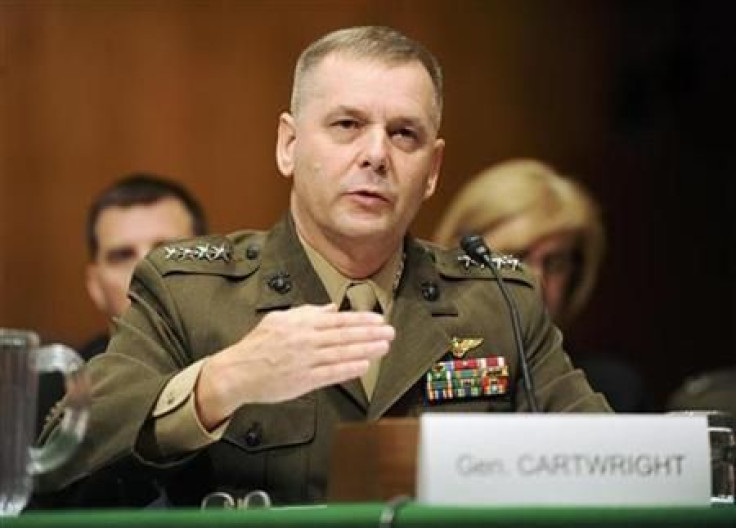Obama’s Favorite General? Cartwright DOJ Leak Investigation Complicates Story Of Stuxnet Cyber-Attack On Iran


When news broke last week that retired Marine Gen. James “Hoss” Cartwright may be the target of a Stuxnet-related leak investigation by the Department of Justice, all journalistic eyes turned to David Sanger, chief Washington correspondent for The New York Times.
In June of last year, Sanger first reported details of a joint U.S.-Israeli covert operation to unleash a cyber-attack on Iran’s nuclear program, ultimately setting it back 18 months. The mission, dubbed Operation Olympic Games, involved a computer worm called Stuxnet, which took out almost one-fifth of the 5,000 centrifuges that Iran had been using to purify uranium. For his story, Sanger said he obtained highly classified information about the attack from “current and former American, European and Israeli officials involved in the program.” That same month he also published a book on the topic, “Confront and Conceal: Obama’s Secret Wars and Surprising Use of American Power.”
But Sanger wasn’t the only journalist reporting on Stuxnet at the time. Dan Raviv, a national correspondent for CBS News, and Yossi Melman, an Israeli journalist, published their book “Spies Against Armageddon: Inside Israel’s Secret Wars” in July 2012, a month after Sanger’s. Raviv and Melman’s book details the history of Israeli intelligence from the 1948 War of Independence down to Stuxnet.
In a phone interview from Tel Aviv, Melman said he was surprised to learn that the DOJ is reportedly investigating Cartwright. “It’s very unusual,” he said. “To target an officer of the highest authority is very strange. Who knows if it’s true?”
When Sanger’s piece appeared, many observers noted that the information -- which included a quote from Vice President Joe Biden at a meeting in the White House Situation Room -- could not have been obtained unless someone in the White House wanted it leaked. It was reasoned that information about the cyber-attack made President Barack Obama look tough on Iran. Melman, too, thought this was a plausible explanation.
“When I read about it, I thought maybe it was not a genuine leak but an authorized leak,” he said. “I thought someone in America was trying to take credit for an Israeli idea. Most of the work was done in Israel.”
But the alleged investigation into Cartwright, which was first reported by NBC News and later confirmed by sources cited by the Times and CBS, complicates the narrative that the leak was White House-approved. Cartwright, a former vice chairman of the Joint Chiefs of Staff, has often been referred to as “Obama’s favorite general.” That he is now the latest in a long line of alleged leakers being probed by the administration is no small detail.
Raviv, Melman’s co-author, was not surprised to learn of the probe and believes we may even glean clues from the wording of the brief statement provided by Cartwright’s attorney, which simply insisted, “Any suggestion that he could have betrayed the country he loves is preposterous.”
In a phone interview, Raviv said the wording is curious, emphasizing not the investigation but an assertion that Cartwright did nothing wrong. “If it’s true he leaked the information, there’s always the possibility that he saw it as authorized,” Raviv said.
Since Obama took office, his administration has charged eight people under the Espionage Act. The sheer aggression which the president has pursued alleged leakers and whistle-blowers has attracted a swarm of criticism from both the press and proponents of government transparency. Raviv pointed out, however, that a number of factors may be contributing to Obama’s seeming tough-on-leaker stance, including stepped-up counterterrorism efforts and the prevalence of technologies that make leaking information easier than ever.
“Since 9/11 it’s been an especially busy time,” he said. “I’m not ready to condemn the administration just yet.”
Got a news tip? Send me an email. Follow me on Twitter: @christopherzara
© Copyright IBTimes 2024. All rights reserved.












